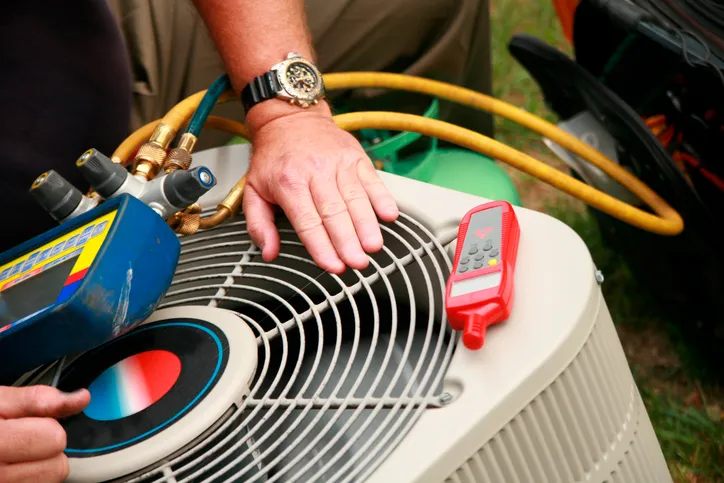Garage Heating & Air Conditioning in Suwanee, GA
Res Air LLC offers trusted garage heating & AC services in Suwanee, GA. Reliable installation and repair for every season. Call us to book HVAC service!
A properly conditioned garage transforms unused square footage into a reliable workshop, storage area, or comfortable vehicle bay. In Suwanee, GA, where hot, humid summers and occasional cool winters create extreme swings in temperature and moisture, garage heating and air conditioning protects tools and vehicles, reduces condensation and mold risk, and makes the space usable year-round. This page explains the common garage HVAC problems in Suwanee homes, how professionals assess the space, the best equipment choices, installation and safety considerations, energy-efficiency measures, and ongoing maintenance to keep your conditioned garage performing reliably.
Common garage heating and air conditioning issues in Suwanee, GA
- High humidity and condensation: Humid summer air leads to sweating on car surfaces, tool rust, and musty odors. Condensation can also compromise drywall and stored materials.
- Overheating in summer: Garages can reach 20 to 40 degrees hotter than outdoors when unconditioned, making them unsuitable for projects or storage without cooling.
- Cold and damp winters: While winters are mild, cold snaps and overnight lows can chill a garage, risking battery failure, frozen pipes, and brittle materials.
- Poor insulation and air leaks: Uninsulated doors, gaps around windows, and unsealed seams let humidity and temperature extremes in, increasing HVAC load.
- Inadequate ventilation for fume control: Vehicle exhaust, propane tools, and paint fumes need proper exhaust or make-up air to keep occupants safe.
- Energy cost concerns: Conditioning an attached or detached garage without zoning or insulation can be expensive if systems are oversized or inefficient.

How garages are assessed for heating and cooling
A smart garage HVAC plan begins with a thorough on-site assessment tailored to Suwanee homes and climate:
- Space use and occupancy: Determine whether the garage will be a workshop, storage, hobby room, or vehicle shelter, and how often it will be used.
- Size and layout: Measure square footage, ceiling height, door and window areas, and adjacency to conditioned living space.
- Insulation and air sealing: Inspect garage door R-value, wall and ceiling insulation, seals, and any bypasses that let air flow to the home.
- Slab and moisture conditions: Check for slab cracks, vapor barriers, and signs of standing moisture that impact humidity control.
- Electrical and gas capacity: Verify available circuits, panel capacity, and safe routing for power or fuel.
- Ventilation and safety needs: Identify combustion appliance presence, vehicle use, and required exhaust or make-up air plans.
This evaluation informs load needs and equipment recommendations so you get the right solution for comfort and efficiency.
Equipment options for a conditioned garage
- Ductless mini-splits: Highly efficient heat pump solution offering cooling and heating without ductwork. Ideal for garages with limited space or where installing ducts is impractical. Benefits include zoning, quiet operation, and good energy performance in Suwanee mild winters.
- Packaged units or through-wall systems: These provide packaged heating and cooling in a single cabinet. Good for larger detached garages or when an exterior sleeve is feasible.
- Electric heaters: Forced-air electric heaters or infrared radiant heaters work well for intermittent use and smaller spaces. They are simple to install but can be more expensive to operate if used continuously.
- Gas heaters: Direct-vent gas heaters deliver fast, economical heat for larger garages. Combustion venting and carbon monoxide management are critical when choosing gas-fired options.
- Heat pumps: Cold-climate models can be very effective in our region, providing efficient heating in winter and cooling in summer with lower operating costs than resistive electric heat.
- Dehumidifiers and ventilation systems: A dedicated dehumidifier or balanced ventilation with heat recovery can control moisture while preserving energy efficiency.
Selecting equipment depends on intended use, insulation level, budget, and whether the garage is attached to the home.
Installation process - what to expect
- Pre-install assessment and load calculation: Professional sizing to match equipment capacity to the actual conditioned load.
- Insulation and air-sealing upgrades: Sealing gaps, upgrading door insulation, and adding wall or ceiling insulation to reduce system strain and energy loss.
- Equipment placement and mounting: Position compressors, indoor units, heaters, and vents for efficient airflow and minimal disruption.
- Electrical and fuel connections: Install or update circuits, breakers, and gas lines with proper capacity and code-compliant safety measures.
- Venting and ductwork (if applicable): Add or modify ducts, intake and exhaust for combustion appliances, and condensate drainage for cooling equipment.
- Commissioning and safety checks: Test system performance, thermostat calibration, refrigerant levels, and verify carbon monoxide alarms and combustion safety where relevant.
- Final inspection and handoff: Ensure everything operates as designed and provide care and maintenance information for long-term performance.
Ventilation and safety considerations
- Carbon monoxide and combustion safety: If using gas-fired heaters, direct venting and sealed combustion are necessary to prevent CO infiltration into the home. Install CO alarms in compliant locations.
- Make-up air and fume control: For garages used with vehicles, paints, or solvents, provide exhaust or periodic ventilation to remove fumes and bring in fresh air safely.
- Combustible storage: Keep flammable materials away from heat sources and follow recommended clearances for heaters and vents.
- Moisture management: Proper drainage, vapor barriers under the slab, and dehumidification prevent mold and structural damage.
- Code compliance: Installations must meet local mechanical, electrical, and building code requirements for safety and performance.
Energy-efficiency tips for Suwanee garages
- Increase insulation and seal gaps around doors and windows to reduce load.
- Upgrade to an insulated garage door and add weatherstripping to minimize infiltration.
- Use a ductless mini-split or heat pump for high seasonal efficiency in our climate.
- Add a programmable thermostat or smart control to avoid conditioning the garage when not in use.
- Use a dehumidifier with a drain or condensate pump to control humidity rather than overcooling.
- Consider zoning so heating and cooling are limited to the garage only, not the whole house system.
Maintenance plans to keep a conditioned garage comfortable year-round
- Schedule annual or biannual tune-ups for heat pumps and mini-splits to check refrigerant, clean coils, and verify performance.
- Replace or clean filters monthly to maintain airflow and indoor air quality.
- Inspect door seals and insulation yearly and repair as needed.
- Test condensate drains, condensers, and dehumidifiers to prevent backups and biological growth.
- Check gas connections, venting, and carbon monoxide detectors if a combustion appliance is present.
A properly designed garage heating and air conditioning system in Suwanee, GA protects belongings, extends living space, and provides consistent comfort while controlling energy costs. With the right assessment, equipment choice, ventilation and safety measures, and routine maintenance, your conditioned garage will be a functional, safe, and efficient part of your home all year long.
Make Your Garage a Space You’ll Actually Use
Don’t let extreme temperatures or humidity keep your garage from being a safe, functional, and comfortable part of your home. Whether you want to protect your vehicles, create a workshop, or add extra living space, Res Air LLC has the expertise to deliver reliable garage heating and air conditioning in Suwanee, GA. Call today to schedule your consultation and start enjoying a garage that works for you year-round.


Financing
We make comfort affordable with flexible financing options through Optimus and Synchrony, giving you stress-free payment solutions for your HVAC needs.


Customer Testimonials
At Res Air, our customers’ satisfaction speaks louder than words. From fast emergency repairs to flawless system installations, homeowners trust us for reliable comfort and professional service.


.png)
.jpg)
